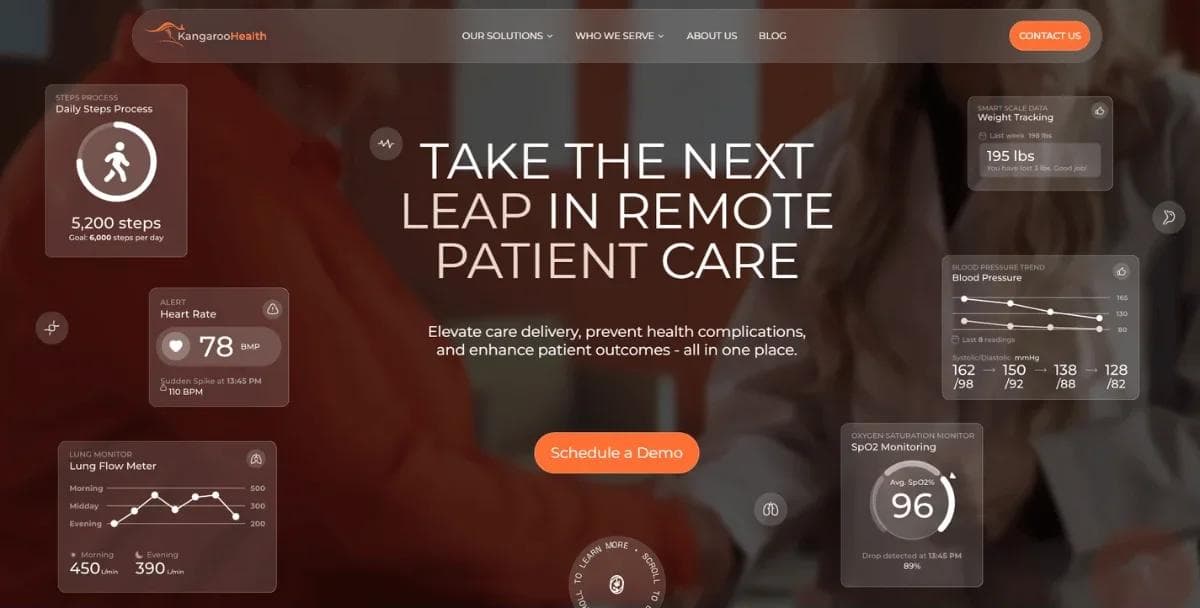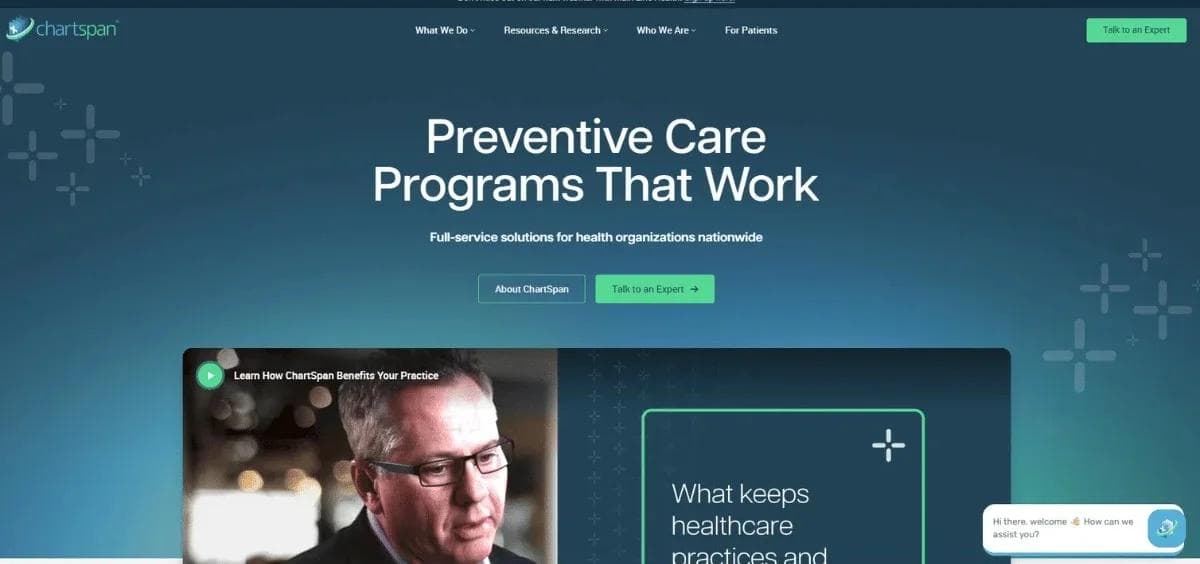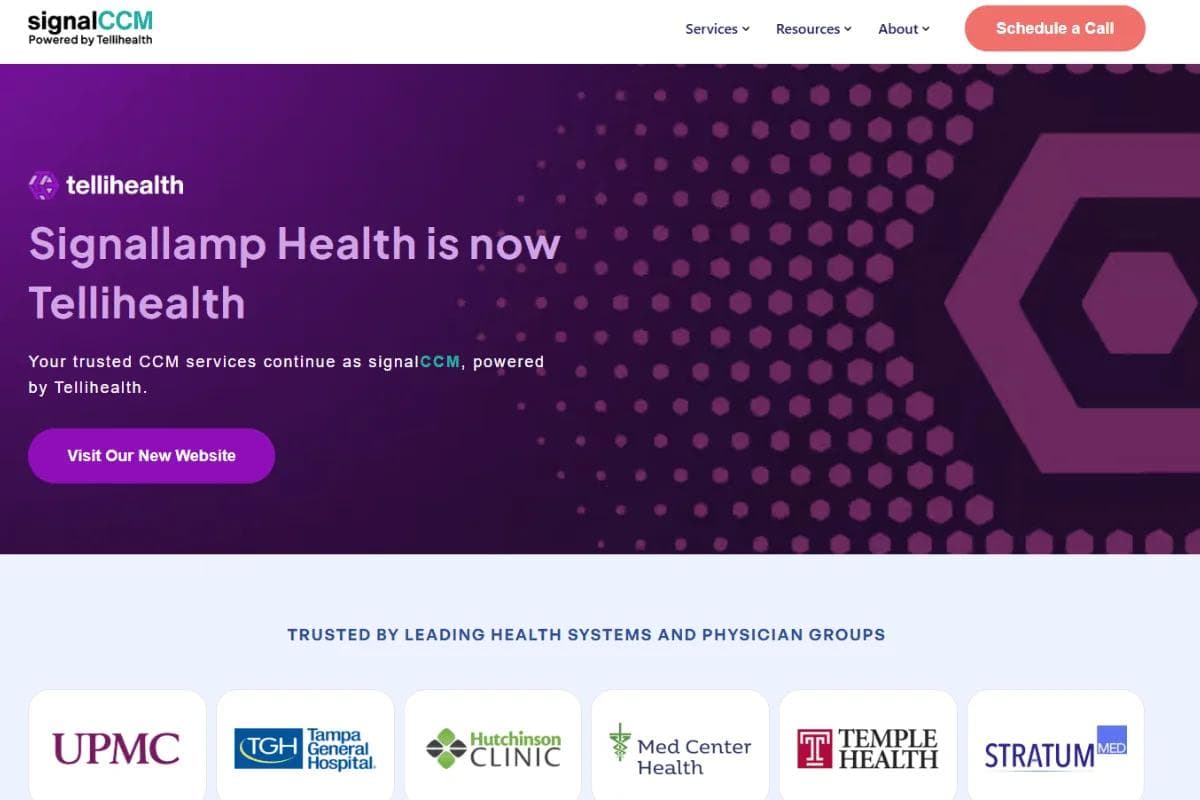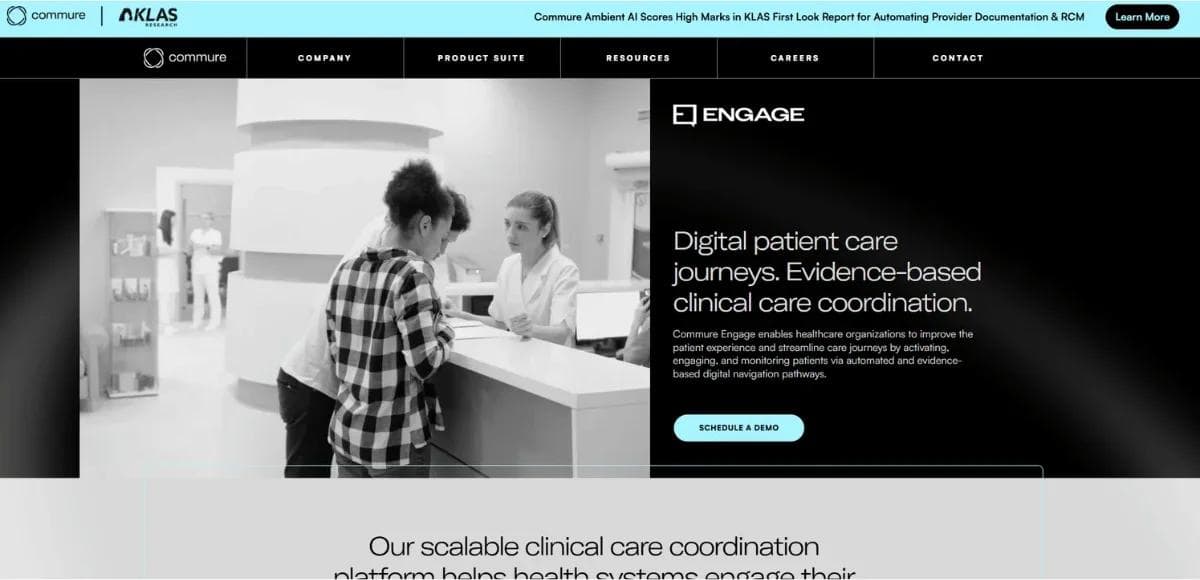
Top Chronic Care Management Companies: Benefits & Features Compared

Author
As CEO and Founder of Kangaroohealth, Dr. Kang is a healthcare innovator with nearly two decades of experience in healthcare and 20+ national and international awards. She received her PhD and medical training from Johns Hopkins University.Dr. Kang, CEO and Founder of Kangaroohealth, is a healthcare innovator with nearly two decades of experience. She has received over 20 national and international awards. Dr. Kang completed her PhD and medical training at Johns Hopkins University.
Chronic care management plays a vital role in the healthcare system, helping millions of patients with conditions like diabetes, heart disease, and hypertension live healthier lives. With proper coordination and support, patients can better manage their medications, avoid complications, and stay out of the hospital. However, providing consistent care coordination can be challenging for healthcare teams who already have full schedules. Many practices find it difficult to deliver the ongoing support that chronic care patients need between office visits. Chronic care management companies offer a practical solution by partnering with healthcare providers to deliver this essential care.
TL;DR - Best Chronic Care Management Companies
Here are the top chronic care management companies based on clinical outcomes, technology integration, and provider satisfaction:
- KangarooHealth: Best AI-assisted platform for all practice sizes
- ChartSpan: 24/7 nurse access for large practices
- CareHarmony: AI-driven predictive analytics with 100% shared savings
- Signallamp: Dedicated nursing for health systems
- Memora Health: SMS-based patient engagement
KangarooHealth has been pioneering connected care since 2015, helping healthcare providers extend their reach to patients' homes.
With over 6 million physiological data points collected and 200,000+ monitoring hours delivered, our multilingual clinical teams and seamless EMR integration make chronic care management simple and effective.
We provide complete support, from staff training and device procurement to clinical monitoring. Plus, we have flexible options for practices that prefer to handle monitoring internally using our platform and devices.
Get started with KangarooHealth today.

What Is Chronic Care Management (CCM)?
Chronic care management is a Medicare benefit that provides care coordination services for patients with two or more chronic conditions.
Chronic conditions are those that would last at least 12 months or until death. They also put patients at significant risk of death, sudden worsening of symptoms, or loss of independence.
Approximately 68.4% of Medicare beneficiaries had two or more chronic conditions, and 36.4% had four or more chronic conditions.
Healthcare providers must spend a certain amount of time each month providing CCM services to qualify for Medicare reimbursement, according to CMS's (Centers for Medicare & Medicaid Services) guidance:
- Basic CCM: At least 20 minutes per month (can be provided by clinical staff).
- Physician-led CCM: At least 30 minutes per month (must be provided by physician or qualified practitioner).
- Complex CCM: At least 60 minutes per month (can be provided by clinical staff but requires more intensive care planning).
Care coordinators work with patients between regular office visits to manage medications, coordinate with specialists, and provide health education.

The Role of Chronic Care Management Companies in Healthcare
The CCM market has grown fast — it was worth $5.57 billion in 2024, is projected to reach $6.87 billion in 2025, and experts expect it will reach $17.28 billion by 2033, according to Straits Research. This growth shows how much healthcare providers need this kind of help.
Chronic care management companies work as special partners that help doctors and healthcare providers take better care of their patients. They fill the gap between what providers want to do and what they can actually handle with their current staff and resources.
These companies give providers everything they need (infrastructure, technology, and clinical staff) to run good CCM programs. Meanwhile, doctors stay in charge of the medical decisions.
Most importantly, CCM companies help smaller doctor offices and rural healthcare providers succeed with these programs.
Professional CCM companies typically achieve much higher patient enrollment rates than practices trying to manage CCM programs on their own. That’s mainly because they have specialized staff and proven systems for patient outreach and engagement.

What Do Chronic Care Management Companies Do?
CCM companies handle the entire care coordination process from start to finish.
Let’s break down this process:
- Find Eligible Patients: They use EHR (Electronic Health Record) systems to search through medical records and identify Medicare beneficiaries with two or more chronic conditions, such as diabetes, heart disease, or high blood pressure.
- Sign Up Patients: For qualifying patients, they explain how the program works, get patient consent (official permission), and set health goals together. This includes providing CMS-required disclosures about program costs and services.
- Create Care Plans: The team builds detailed electronic health plans that list all medications, allergies, health problems, and goals. These plans get updated regularly as the patient’s conditions change.
- Monthly Check-ins: They provide the CMS-required minimum 20 minutes of care coordination per patient each month to review medications, schedule appointments, provide health education, and check on how patients are feeling.
- Coordinate Care: They help primary care providers, specialists, and hospitals communicate with each other about the patient's care and ensure everyone has the same information.
- Handle Paperwork and Billing: They keep all CMS-compliant records for Medicare and and provide the documentation monthly or as needed for compliant and accurate billing.

Key Features to Look for in a CCM Company
The right CCM company should show clinical excellence through qualified care teams and proven results.
Look for companies that employ registered nurses (RNs) with chronic disease management training and specialized protocols for common conditions.
You should also consider the following points when choosing a CCM provider:
- Technology Integration: The company should connect smoothly with major EHR systems like Epic, Athena, eClinicalWorks, and Cerner. Real-time data synchronization means that the information updates instantly across all systems, preventing documentation gaps and reducing paperwork burden.
- Security Certifications: Companies must have HIPAA compliance (federal law protecting patient privacy) and SOC 2 Type 2 certification (independent security validation). Since they handle sensitive patient data, they need strong cybersecurity measures and comprehensive data breach insurance.
- Patient Enrollment Success: How well companies get patients to join varies widely between providers. Top companies achieve high enrollment rates through proven engagement strategies and patient education programs. Ask for specific enrollment data and patient retention metrics to compare performance.
- Billing Efficiency: Companies should handle automated CPT code management (medical billing codes) and maintain high, clean claim submission rates to ensure you get paid quickly and accurately. They should provide transparent revenue tracking and comprehensive audit preparation support for Medicare reviews.
- Scalability: The platform should grow with your practice while maintaining performance standards. Look for companies offering flexible pricing models and different service levels based on your patient volume.
- Clinical Outcomes: Ask for documented proof of improved patient health outcomes, like reduced hospital readmissions, better medication adherence, and improved chronic disease management metrics.

Top Chronic Care Management Companies
Choosing the right chronic care management company can make a difference in patient outcomes and practice revenue.
The best CCM companies combine clinical expertise, proven technology, and strong support systems to help healthcare providers succeed.
Here are the leading companies in the market:
1. KangarooHealth

KangarooHealth provides a comprehensive AI-assisted platform that extends care beyond clinic walls, combining smart technology with real human connection.
We use multilingual care teams who can speak to patients in their preferred language through phone calls, texts, and apps.
KangarooHealth has helped reduce health emergencies by 48%, and 98% of doctors are happy with our service.
Key Features:
- Multilingual Clinical Teams: US-based clinicians fluent in multiple languages ensure every patient feels heard and supported.
- High Nurse-to-Patient Ratios: Personalized care with dedicated nurses who build strong relationships with patients through regular, meaningful check-ins.
- Omnichannel Communication: Multiple yet simple communication tools, such as phone and text messaging, so patients stay connected to their care from wherever they are.
- White-Label Services: Fully integrated into your practice ecosystem as an extension of your team.
Technology Advantages:
- Seamless EMR (Electronic Medical Record) integration with any system — no custom builds required.
- Secure mobile app with encrypted messaging, video and image sharing.
- Real-time alerts and configurable care pathways.
New providers can go live within two weeks with streamlined onboarding requiring only 2-3 hours of staff education time.
Learn more about KangarooHealth's chronic care management solutions.
2. ChartSpan

ChartSpan serves 175+ practices and health systems with care coordination solutions. They provide:
- 24/7 patient access to their care line
- MIPS & Quality Improvement Program services
- Patient enrollment and care plan management
- Staff workload reduction through outsourced coordination
ChartSpan reports patient savings of $2,457 per year and 20% fewer hospitalizations, though their focus on larger practices means smaller clinics may find their services less customized to their specific needs.
3. CareHarmony

CareHarmony offers AI-driven care coordination through its Symphony technology platform. Their services include:
- CareBlocks™ personalized care modules
- Community partner network access
- Social determinants of health screening
- Machine learning capabilities
The company claims 100% shared savings in 2021 and higher ACO quality scores, but their AI-heavy approach may require more technical expertise from practice staff to manage effectively.
4. Signallamp

Signallamp works with health systems using employed RNs (Registered Nurses) and LPNs (Licensed Practical Nurses) for patient care.
Their model features:
- Nurses working consistently with the same patients
- Direct EHR workflow integration
- Documentation in existing EMR systems
- Service across multiple health systems
They report 15-20% cost reductions and high patient retention, though their dedicated nursing model can be cost-prohibitive for smaller independent practices.
5. Memora Health

Memora Health provides AI-powered patient communication through SMS messaging.
Their platform offers:
- Automated patient inquiry responses
- EHR integration capabilities
- Intelligent triaging features
- Text-based patient engagement
Recently acquired by Commure, they report high engagement and satisfaction rates. However, their SMS-focused approach may not work well for older adults who prefer phone communication.
Benefits of Partnering with a CCM Company
Partnering with a CCM company offers healthcare providers multiple advantages that go beyond just additional revenue streams:
Higher ROI and Financial Returns
Healthcare providers can expect meaningful returns on CCM implementation.
According to a pilot study from UT Southwestern in 2023, practices can expect approximately $332-$372 per enrolled patient annually.
A practice with at least 131 enrolled Medicare patients can recoup the salary and overhead costs of hiring a full-time RN to provide CCM services. Larger programs generated over $5,000 of net annual revenue per full-time physician.
Note: Average Medicare reimbursement rates have increased since this calculation (it’s updated annually), with CPT 99490 now averaging $62.16. Actual ROI will be much higher for current implementations.
For example:
A 200-patient CCM program will generate:
- 200 patients × $62.16 (CPT 99490 current Medicare rate) × 12 months = $149,184 annual revenue
Implementation cost breakdown:
- Care manager salary: ~$56,357 annually (based on national average)
- CCM software and technology: varies by vendor
- Additional operational costs: ~$12,000 annually
- Total estimated costs: ~$68,357
Financial results:
- Net profit: $149,184 - $68,357 = $80,827 (minus CCM service and software charges)
These are industry estimates, and actual results can vary based on:
- Patient enrollment rates
- Staff efficiency
- Technology costs
- Practice overheads
Other than the financial benefits, there are also clinical and administrative advantages:

Clinical Outcomes
CCM companies help patients stay healthier and avoid costly medical emergencies.
A large government study by Mathematica Policy Research followed over 684,000 Medicare patients during the first two years of the CCM program. They found that those receiving CCM services had fewer trips to the hospital and emergency room compared to similar patients who didn't get these services.
Hospital stays were reduced significantly:
- After 6 months: 32 fewer hospital stays per 1,000 CCM patients.
- After 12 months: 47 fewer hospital stays per 1,000 CCM patients.
- After 18 months: 99 fewer hospital stays per 1,000 CCM patients.
- This means if you have 1,000 CCM patients, you'll see 32-99 fewer hospitalizations compared to 1,000 similar patients without CCM.
Emergency room visits also dropped:
- After 6 months: 31 fewer ER visits per 1,000 CCM patients.
- After 12 months: 23 fewer ER visits per 1,000 CCM patients.
- After 18 months: 76 fewer ER visits per 1,000 CCM patients.
- For every 1,000 patients in your CCM program, expect 23-76 fewer emergency room trips.
You can see that the benefits got even better over time — patients who received CCM services for 18 months saw bigger improvements than those who only got 6 months of care.
CCM patients were also less likely to be hospitalized for serious complications from conditions like heart failure, diabetes, infections, and pneumonia.
When patients get regular check-ins and medication monitoring, they're more likely to take their medicines correctly and catch problems early before they become serious.
Care coordinators also help different doctors communicate better with each other, which prevents medical mistakes and ensures everyone is working toward the same health goals for the patient.
Operational Advantages
Operational advantages include reduced administrative burden for existing staff. CCM companies handle care coordination documentation and billing, allowing you to focus on direct patient care activities.
Quality score improvements for MIPS and Star Ratings benefit value-based care contracts and bonus payments. Patient satisfaction increases through improved access, communication, and care coordination between office visits.

How to Choose the Right CCM Company
Start with a practice-readiness evaluation to analyze your current Medicare patient population, specifically those with two or more chronic conditions who qualify for CCM services.
Assess your existing staff capacity, technology infrastructure, and financial resources for implementation.
Most practices need months to see positive ROI (return on investment), so make sure you have adequate cash flow during the startup period.
Once you understand your practice's readiness, follow these key steps to evaluate and select the right CCM partner:
- Create a Structured Evaluation Process: Build an evaluation framework that weighs different factors like clinical excellence, technology integration, operational performance, and financial model. This structured approach prevents emotional decision-making based on persuasive sales presentations.
- Conduct Reference Checks: Contact 3-5 current clients with a similar practice size to yours. Ask about client satisfaction rates, patient retention metrics, implementation challenges, and ongoing support quality. Get specific performance data, including enrollment rates, quality improvements, and financial outcomes.
- Request Performance Demonstrations: Ask potential vendors to show you their platform in action. Have them walk through patient enrollment, care plan creation, monthly outreach workflows, and reporting capabilities. Test the user interface yourself to see if it's intuitive for your staff.
- Analyze Contract Terms: Look for service level agreements (SLAs) that establish patient enrollment guarantees, response time commitments, documentation standards, and system availability requirements. Review contract terms, quality improvement expectations, and patient satisfaction commitments to ensure realistic and achievable goals.
- Assess Risk Management: Review data breach insurance coverage, performance penalties for unmet goals, clear termination procedures, and intellectual property protections. Look for flexible pricing that starts lower and increases as you enroll more patients, plus shared revenue models where both you and the company benefit from success.
Also, look for companies with proven track records and strong industry partnerships.
At KangarooHealth, we have a partnership with the National Association of Rural Health Clinics, which shows our commitment to helping rural healthcare providers succeed with CCM programs.

Mistakes to Avoid When Choosing a Chronic Care Management Company
Choosing the wrong CCM company can cost your practice money and create compliance problems.
Here are the most common mistakes healthcare providers make and how to avoid them:
- Inadequate Staffing Assessment: Many practices underestimate how much work CCM requires, leading to poor patient care and staff burnout. Remember to factor in vacation time, sick leave, and training periods when calculating staffing needs.
- Poor Patient Identification: Not doing a thorough EHR analysis to find qualifying Medicare patients results in low enrollment rates and reduced revenue. Work with your chosen company to systematically identify all Medicare patients with multiple chronic conditions before launching the program.
- Documentation Gaps: Inadequate time tracking and record keeping create audit vulnerabilities. CMS audits focus heavily on documentation compliance. Choose companies with automated documentation systems and built-in compliance checks to avoid problems during Medicare reviews.
- Falling for Financial Red Flags: Avoid companies with unclear fee structures, unrealistic revenue promises without supporting data, or large upfront payments without performance guarantees. Also, be wary of vendors who won't share any financial risk or offer performance-based compensation.
- Ignoring the Quality of Technology: Stay away from companies with poor user interface design, limited reporting capabilities, no mobile access, and inadequate security measures.
- Skipping Reference Checks: Not talking to current clients means you miss important information about the company's actual performance, customer service quality, and implementation challenges.
Don’t rush the decision. Avoid the temptation to accept the first offer or make a decision based solely on sales presentations.

Frequently Asked Questions (FAQs)
Before we wrap up, below are common questions healthcare providers ask when evaluating chronic care management companies:
How Much Does Chronic Care Management Cost?
CCM costs depend on whether you choose basic software or full-service solutions. Pricing varies based on patient volume, features included, and level of support provided. Most practices see positive ROI within the first year through Medicare reimbursements.
Healthcare organizations can also access special pricing through group purchasing agreements, such as KangarooHealth's national agreement with Premier, Inc., which helps reduce implementation costs for member hospitals and health systems.
How Long Does It Take to See ROI From CCM Programs?
Most practices break even within the first year of implementation.
Clinical improvements are typically seen within a few months of starting the program. Hospital readmission reductions normally happen within several months of program launch.
What Software Do Most CCM Companies Use?
Most CCM companies use platforms that connect with major EHR systems like Epic, Cerner, and Athena for seamless data sharing. At KangarooHealth, we use an AI-assisted turn-key platform with EMR integration.
Plus, we've partnered with Zephyr AI for advanced machine learning capabilities.
Conclusion
Healthcare providers are choosing CCM partners that deliver real results, not just technology. The best chronic care management service companies combine clinical expertise with proven outcomes to help practices meet the care needs of their patients.
KangarooHealth stands apart with our comprehensive connected care platform that supports over 50 chronic conditions. Our multilingual, US-based clinical teams provide personalized care coordination that fits seamlessly into your existing workflows.
With fast setup, zero system disruption, and built-in compliance tools, we make chronic care management simple and profitable. Experience why leading healthcare organizations trust KangarooHealth — let's discuss how we can support your practice.

Dr. Xiaoxu Kang
AuthorAs CEO and Founder of Kangaroohealth, Dr. Kang is a healthcare innovator with nearly two decades of experience in healthcare and 20+ national and international awards. She received her PhD and medical training from Johns Hopkins University.Dr. Kang, CEO and Founder of Kangaroohealth, is a healthcare innovator with nearly two decades of experience. She has received over 20 national and international awards. Dr. Kang completed her PhD and medical training at Johns Hopkins University.


